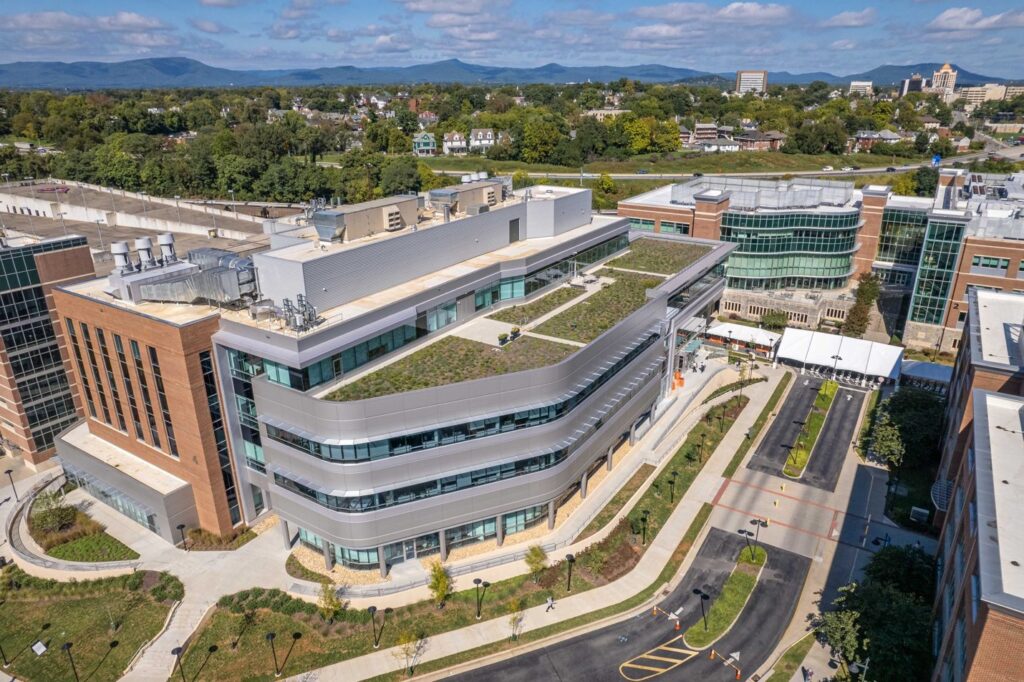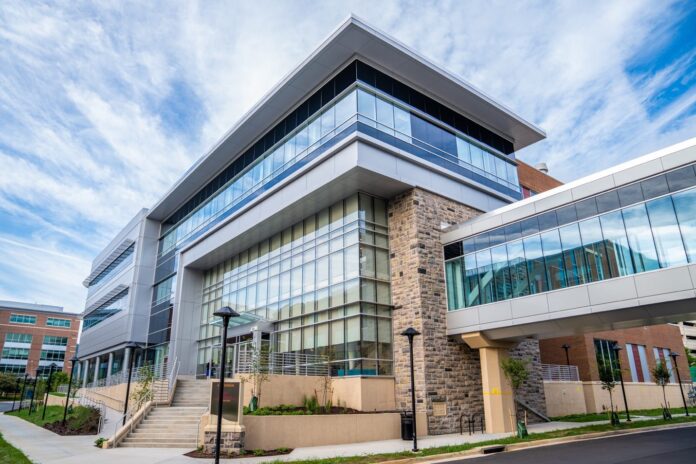The new Fralin Biomedical Research Institute at VTC Addition recently achieved Leadership in Energy and Environmental Design (LEED) Silver certification, an internationally recognized distinction deeming the structure a model for sustainable architecture.
The recognition by the U.S. Green Building Council (USGBC) adds the 139,000-square-foot building at 4 Riverside Circle on the Health Sciences and Technology campus in Roanoke to a growing number of LEED certified Virginia Tech buildings.
Since summer 2020, the building has been occupied by Fralin Biomedical Research Institute laboratories and core facilities, the Virginia-Maryland College of Veterinary Medicine’s Animal Cancer Care and Research Center, and Carilion Clinic training classes. It formally opened at a ceremony in October.
Obtaining LEED certification for campus buildings is a critical aspect of the university’s 2020 Climate Action Commitment to strive toward a carbon-neutral campus by 2030. LEED certification has for years been the most widely used green building rating system in the world, with standards encouraging energy efficient, cost-saving, healthy, and safe construction.
Scientific laboratory and medical buildings are particularly challenging to build to LEED certification standards because they tend to require high amounts of energy, said Sarah Glenn, associate director of facility development and technical operations at Fralin Biomedical Research Institute. A large part of that energy use is the need to circulate 100 percent fresh air through the laboratories, instead of re-circulating preconditioned air.
“This recognition is really significant for a building like this, that’s so energy intensive,” said Glenn, who worked on the building as an engineer before joining the research institute. “The LEED energy requirements have become more stringent over time, so we had to meet a rigorous baseline level to be even considered.”
“Our mission at the Fralin Biomedical Research Institute is always to use science to improve human health, so it naturally follows that we would create our built environment to support that goal,” said Michael Friedlander, executive director of the research institute and Virginia Tech’s vice president for health sciences and technology. “It’s a credit to the commitment of Virginia Tech and its Division of Campus Planning, Infrastructure, and Facilities, the architects at AECOM, the builders at Skanska, and our own team that we’ve been able to build a state-of-the-art science facility that is also an exemplar for sustainable construction and operation.”

The attributes and construction methods that contributed to the building’s LEED certification include:
- A meadow garden green roof to reduce energy use, contribute to biodiversity, and reduce rainwater runoff, which is especially important for reducing flooding and pollution in the nearby Roanoke River.
- A white roof to reflect sunlight and sunshades to cut heat and energy consumption.
- Air handling equipment to pre-treat outside air for a 14.6 percent energy cost savings.
- Vacancy sensors and LED lighting.
- Building envelope commissioning to ensure the structure is energy efficient.
- Low flow plumbing fixtures and a 24,000-gallon cistern to collect rainwater runoff for reuse to flush toilets for a 60.8 percent water use reduction.
- Carpets and paints that emit low- to no-volatile organic compounds, for healthier indoor air quality.
- Diversion of 86.7 percent of construction waste from landfills.
- Responsible sourcing of 30.7 percent of construction materials.
Read more and watch video about the grand opening of the Fralin Biomedical Research Institute Addition.

